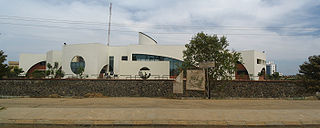External links
- ↑ "Most important 10 tricks to prepare well for the Indian Chemistry Olympiad (INChO)| Kaitholil.com". kaitholil.com. Retrieved 2022-08-12.
The Indian National Chemistry Olympiad (INChO for short) is an Olympiad in Chemistry held in India.
The theory part of the INChO examination is held in end-January/beginning of February of every year. It is conducted by the Indian Association of Chemistry Teachers. School students (usually of standards 11 and 12) first need to qualify the National Standard Examination in Chemistry (NSEC) held in November of the preceding year. Among the 30,000+ students who sit for the NSEC, only the top 1% are selected for the INChO.
About 35 students are selected from the written examination. A total of 30 students are chosen from these to attend the Orientation-Cum-Selection-Camp (OCSC), chemistry, held at HBCSE, Mumbai.
Most students qualifying for the INChO are those completing their twelfth standard [1] . However, in some cases, students have been selected for INChO at the end of the eleventh or tenth standard.
The Orientation-Cum-Selection-Camp (OCSC), Chemistry, consists of rigorous training and testing in theory and experiment. The top four performers here are selected to represent India in the International Chemistry Olympiad. Before the INChO, the selected team undergoes rigorous training in theory and experiments in a Pre-Departure Training Camp held in HBCSE.
The International Chemistry Olympiad (IChO) is an annual academic competition for high school students. It is one of the International Science Olympiads. The first IChO was held in Prague, Czechoslovakia, in 1968. The event has been held every year since then, with the exception of 1971. The delegations that attended the first events were mostly countries of the former Eastern bloc and it was not until 1980, the 12th annual International Chemistry Olympiad, that the event was held outside of the bloc in Austria. Up to 4 students for each national team compete around July in both a theoretical and an experimental sections, with about half of the participants being awarded medals.
The United States National Chemistry Olympiad is a contest held by the American Chemical Society (ACS) used to select the four-student team that represents the United States at the International Chemistry Olympiad (IChO).
Joint Entrance Examination – Advanced (JEE-Advanced), is an academic examination held annually in India. It is organised by one of the seven zonal IITs under the guidance of the Joint Admission Board (JAB) on a round-robin rotation pattern for the qualifying candidates of the JEE-Main. It was used to be the sole prerequisite for admission to the Indian Institutes of Technology bachelor's programs before the introduction of UCEED, Online BSc and Olympiad entry but seats through these new mediums are very low.

Chennai Mathematical Institute (CMI) is a higher education and research institute in Chennai, India. It was founded in 1989 by the SPIC Science Foundation, and offers undergraduate and postgraduate programmes in physics, mathematics and computer science. CMI is noted for its research in algebraic geometry, in particular in the area of moduli of bundles.
The Indian National Mathematical Olympiad (INMO) is a high school mathematics competition held annually in India since 1989. It is the third tier in the Indian team selection procedure for the International Mathematical Olympiad and is conducted by the Homi Bhabha Centre for Science Education (HBCSE) under the aegis of the National Board of Higher Mathematics (NBHM).
The Indian National Physics Olympiad is the second stage of the five-stage Olympiad programme for Physics in India. It ultimately leads to the selection in the International Physics Olympiad.
This article describes the selection process, by country, for entrance into the International Mathematical Olympiad.

The Mahatma Gandhi Institute of Medical Sciences (MGIMS) is India’s first rural medical college, nestled in the karmabhoomi of Mahatma Gandhi, in Sevagram. It is managed by the Kasturba Health Society. The college was earlier affiliated to the Nagpur University (1969–1997) and from year 1998 it is now affiliated to the Maharashtra University of Health Sciences (MUHS), Nashik.
The Mathematical Olympiad Cell is a body of permanent faculty devoted to organizing and conducting the mathematical Olympiads in India, in particular, the Indian National Mathematical Olympiad and the International Mathematical Olympiad Training Camp. The MO Cell has three main members:

Homi Bhabha Centre for Science Education (HBCSE) is a National Centre of the Tata Institute of Fundamental Research (TIFR), Mumbai, India. The broad goals of the institute are to promote equity and excellence in science and mathematics education from primary school to undergraduate college level, and encourage the growth of scientific literacy in the country. To these ends it carries out a wide spectrum of inter-related activities, which may be viewed under three broad categories:

The Indian Association of Physics Teachers or IAPT is a body that coordinates the Physics Olympiad for India along with HBCSE.
The National Standard Examination in Chemistry or NSEC is an examination in chemistry for higher secondary school students in India, usually conducted in the end of November. The examination is organized by the Indian Association of Chemistry Teachers. Over 30,000 students, mainly from Standard 12, sit for this examination.
The Association of Mathematics Teachers of India or AMTI is an academically oriented body of professionals and students interested in the fields of mathematics and mathematics education.
The National Mathematics Talent Contest or NMTC is a national-level mathematics contest conducted by the Association of Mathematics Teachers of India (AMTI). It is strongest in Tamil Nadu, which is the operating base of the AMTI. The AMTI is a pioneer organisation in promoting, and conducting, Maths Talent Tests in India. In the National level tests 66,066 students, from 332 institutions spread all over India, participated at the screening level. Of these, 10% were selected for the final test. For the benefit of final level contestants, and the chosen few for INMO, special orientation camps were conducted. Merit certificates and prizes were awarded to the deserving students.

Sainik School at Korukonda informally began on 10 September 1961. The school was formally founded by its first principal, Commander Trevor De Almeida, on 18 January 1962, when the first batch of 205 students had joined.
The Indian Association of Chemistry Teachers or IACT, now known as the Association of Chemistry Teachers or ACT, is a body that coordinates the Chemistry Olympiad for India along with Indian Association of Physics Teachers and HBCSE. ACT conducts the National Standard Examination in Chemistry in November of each year throughout the country in collaboration with IAPT, with approximately 30,000-35,000 participants. The top 1% then sit for the Indian National Chemistry Olympiad, from where the top thirty students are selected for the International Chemistry Olympiad Training Camp, usually conducted at HBCSE. Here, the team for the International Chemistry Olympiad is selected.
The National Standard Examination in Biology or NSEB is an examination for biology for higher secondary school students in India, usually conducted in the end of November. The examination is organized by the Association of Teachers in Biological Sciences in association with Indian Association of Physics Teachers and Homi Bhabha Centre for Science Education (HBCSE). Each year over 30,000 students of 12th Standard or below, sit for this examination.
The National Standard Examination in Astronomy or NSEA is an examination in astronomy and astrophysics for higher secondary school students, usually conducted in the end of November. Organized by the Indian Association of Physics Teachers in association with Homi Bhabha Centre for Science Education (HBCSE), NSEA is the first stage of selection of students in the IOAA. The NSEA is carried out every year since 1987 in English, Hindi & a few other Indian languages. About 16000 students from over 1,200 centres take part in these olympiads.
The National Standard Examination in Junior Science or NSEJS is an examination in Science for secondary school students, usually conducted in the end of November. Organized by the Indian Association of Physics Teacher in association with Homi Bhabha Centre for Science Education (HBCSE), NSEJS is considered toughest Science exam on higher secondary level globally. The NSEJS is carried out every year since 1987 in English, Hindi & a few other Indian languages. More than 80,000 students from over 1,500 centres take part in these olympiads.

The Junior Science Olympiad of Canada or JSOC is an examination in science for secondary school students, with one test usually conducted in June and a second test in October. Organized by Jennifer Pitt-Lainsbury, Marisca Vanderkamp, Maria Niño-Soto, and Andrew Moffat in association with the University of Toronto Schools (UTS), JSOC encompasses material of the grade 12 curriculum for the three sciences.